 Game Rules Game Rules
 |
The Basics |
On Texas Hold'em tables and Omaha tables, to take part in the action, you must pay the Blinds when it's your turn. In cash game play, you have the option of not paying the Blinds, which will sit you out from the game play. When playing in tournaments, paying the Blinds is obligatory and will happen even if you sit out from the table.
There are two Blinds - the Small Blind and the Big Blind. The Big Blind is set at the lower limit of the table and the Small Blind is generally half the size of the Big Blind. At the start of each game or "Hand" the player to the left of the dealer button must pay the Small Blind and the next player must pay the Big Blind. In heads-up matches, the dealer pays the Small Blind and his/her opponent pays the Big Blind. The dealer button will move one place around the table and thus the Blind paying players will change.
If players miss paying the Blinds in a cash game because they are sat out, they will be expected to pay both Blinds before they can re-join the game.
When players join a game, they will be expected to pay the Big Blind before they can take part, they can either pay the Blind at the next possible opportunity or choose to wait until the Big Blind position.
When players are re-seated during tournament play, as the tournament progresses and tables are closed, we try to reseat them in a manner such that they are seated in the closest matching position in relation to the dealer button; this is done so they do not experience a loss (or a gain) due to the reseating.
 |
Posting Blinds |
On Texas Hold'em tables and Omaha tables, to take part in the action, you must pay the blinds when it's your turn. In cash game play, you have the option of not paying the blinds, which will sit you out from the game play. When playing in tournaments, paying the blinds is obligatory and will happen even if you sit out from the table.
There are two blinds - the small blind and the big blind. The big blind is set at the lower limit of the table and the small blind is generally half the size of the big blind. At the start of each game or "Hand" the player to the left of the dealer button must pay the small blind and the next player must pay the big blind. In heads-up matches, the dealer pays the small blind and his opponent pays the big blind. The dealer button will move one place around the table and thus the blind paying players will change.
If a player misses paying the blinds in a cash game because he is sat out he will be expected to pay both blinds before he can re-join the game.
When a player joins a game, he will be expected to pay the big blind before he can take part, they can either pay the blind at the next possible opportunity or choose to wait until the big blind position.
When players are re-seated during tournament play, as the tournament progresses and tables are closed, we try to reseat them in a manner such that they are seated in the closest matching position in relation to the dealer button; this is done so they do not experience a loss (or a gain) due to the reseating.
 |
Hand Rankings |
A standard card deck contains 52 cards. there are four suits and each card has a ranking that runs downward from Ace-King-Queen and so forth down to 2 (two). The Ace, however, can be used as a 1 (one). The four suits are spades, hearts, clubs and diamonds.
Most poker games are played with seven cards some of which are community cards that everyone can use. During the course of the game, you must build the best 5-card hand. Possible winning hands are based in order of the odds of their occurrence and are ranked, starting with the highest:
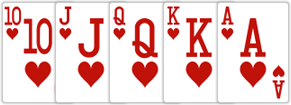
|
|
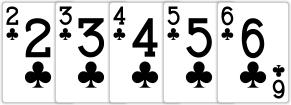
|
| Royal Flush: |
|
Straight Flush: |
|
A royal flush is the absolute nuts and can't be beaten. It consists of the Ace, King, Queen, Jack and 10 (ten) of a single suit.
|
|
Five cards of the same suit in sequence. In the event of a tie, the highest rank at the top of the sequence wins.
|
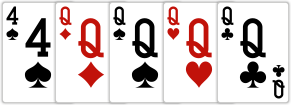
|
|
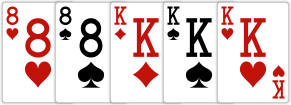
|
| Four of a Kind: |
|
Full House: |
|
Four cards of the same value, for example four Jacks, and one fifth card or “kicker”. In the event of a tie, the player with the highest kicker card wins.
|
|
Three cards of the same value (a Set), and two other cards of the same value (a Pair). In the event of two full houses, the highest three matching cards win.
|
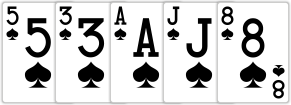
|
|
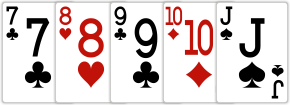
|
| Flush: |
|
Straight: |
|
Five cards of the same suit, which are not in a value order or sequence. The player holding the highest card wins.
|
|
Five non-suited cards in sequence. The highest card at the top of the sequence wins.
|
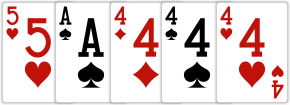
|
|
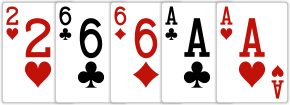
|
Three of a Kind ("Trips" or "Set"):
|
|
Two Pair: |
|
Three cards of the same value, and two unrelated side cards. If two players are holding sets, the player with the highest set wins, if both players hold a set of the same value then the highest side card (“kicker”) wins.
|
|
Two cards of matching rank and three unrelated side cards. In the event of a tie, the player with the highest, and if necessary, second or third-highest side card wins.
|
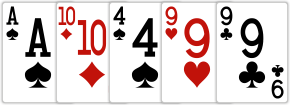
|
|
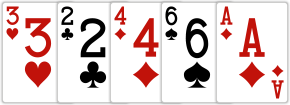
|
| Pair: |
|
High Card: |
|
Any hand that does not qualify under the categories previously listed. In the event of a tie, the highest card wins, such as “Ace-high”.
|
|
Any hand that does not qualify under the categories listed. In the event of a tie, the highest card wins, such as ‘ace-high’.
|
 |
All In |
Players can never be forced out of a hand because they do not have enough chips to call the bet.
However, players can only win (from each opposing player) as many chips as they bet or wage into the pot. If a player only puts 10 chips into a pot, he/she can only win 10 chips from each opposing player.
A side pot will be formed containing the chips over and above what an all-in player has contributed to the main pot. The all-in player has no claim to any chips held in the side pot. All three players would be eligible to win the main pot, but only the two players who contributed chips to the side pot would be eligible to win it.
Multiple side pots can get complicated when two or more players go all-in. As a general rule, the first player to go all-in is eligible for the main pot only. The next all-in player is eligible for the first side pot and the main pot and the next all-in player is eligible for the second side pot, the first side pot and the main pot, etc.
 |
Basic Game Tips |
First of all, taking notes on your opponents is the best way of learning their way of playing. By taking good notes you will be able to track opponents who have made mistakes in the past and take advantage of their mistakes.
You can also get hand histories, especially when players don't show their hand at the river. You can simply click the hand number at the top right of the screen and open the Hand History window, where losing hands can be seen. Showdown information can very important in order for you to understand your opponents’ decision making process.
Moreover, you should wait your turn before posting the Big Blind. This gives you invaluable time to evaluate your opponents. Be patient, take notes and learn how your opponents play.
Learn to leave the table
If you find that you are being outplayed or even if you are just unlucky at the table, it is more than okay to leave. Don't go “on tilt” trying to win back your losses; other players are more likely to play against you.
If the game gets short-handed and you are not familiar with short-handed play, then you’d better leave the game.
Protect your computer
Make sure you use an anti-virus and a firewall. You’d better scan your computer often to remove any adware or spyware which may be accidentally downloaded from the internet. Your computer security should be of high priority, in order to keep your account details safe.
Use a four-color deck
If you would like to play at multiple tables, we recommend using a four-color deck, in order to be able to read your hand correctly, make decisions faster and avoid making mistakes.
|
 Game Rules
Game Rules